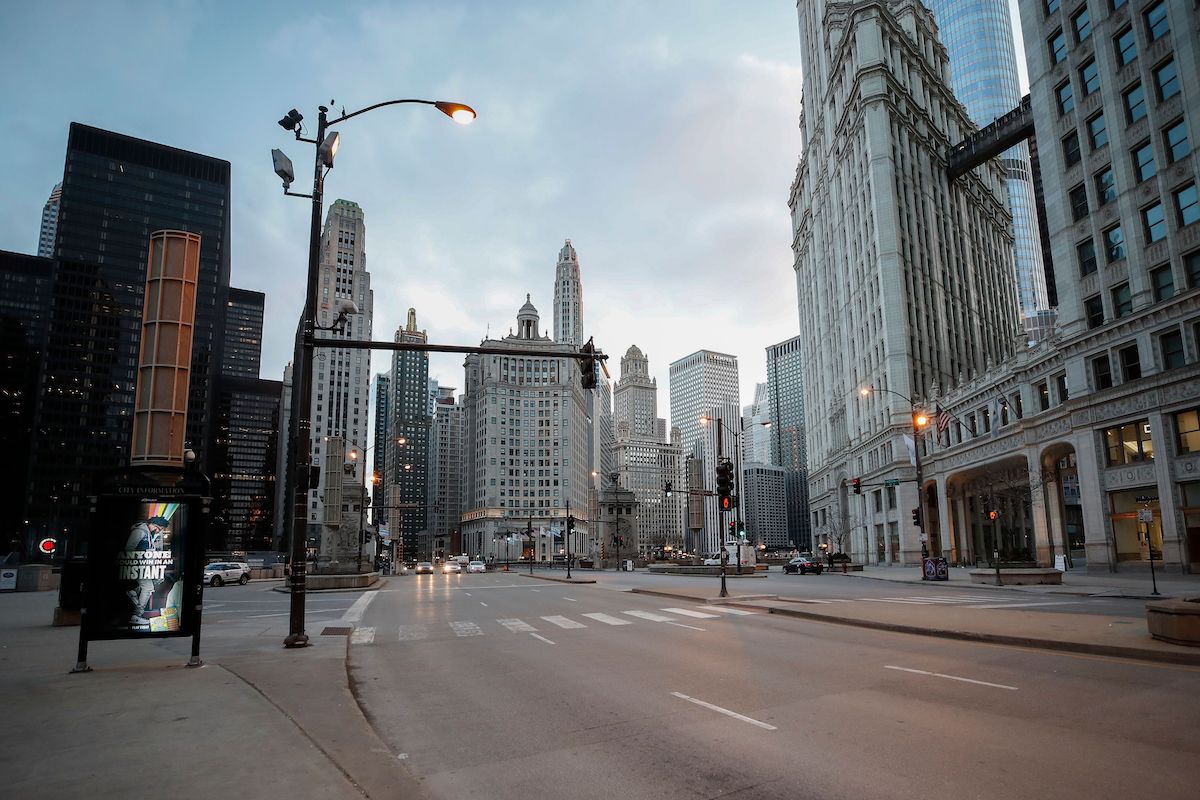

Empty Michigan Avenue is seen in Chicago, Illinois, on March 21, 2020. (Photo by KAMIL KRZACZYNSKI/AFP via Getty Images)
CHICAGO — I keep hearing questions about summer school and addressing the “lost learning” Chicago Public Schools students will experience during this pandemic because they’re going to “fall behind,” especially if they’re low-income Black and Brown kids.
We know the effects of this pandemic will linger for a long time.
Economically, Latino communities are predicted to receive the biggest threat to health and finances during the pandemic, according the Pew Research Center.
In Chicago, the African-American community suffers from the highest rates of COVID-19 cases and deaths.
One reporter also highlighted the data-collection challenges with identifying COVID-19 cases in the Latino community.
We’re living, teaching, and learning in a situation many of us never seriously imagined.
One of my best buddies reminded me in a conversation last week how these circumstances —lost wages, housing insecurity, unexpected illness— have been faced by so many of our Latino families for generations. Still, we find success in traditional and non-traditional ways.
However, those who remain obsessed with replacing our students’ “lost learning” have probably only found success in traditional systems that perpetuate inequality.
I spoke with one immigrant parent whose family faced incredible economic challenges this month. The parent told me in Spanish while holding back tears, that as long as their family has their health, they’ll make it through.
What about those lessons? What about the values families instill in young people during this time: ideas of unity, perseverance, generosity, inner peace? Those learning experiences carry more weight than any traditional lesson a school can provide.
This idea of “lost learning” comes from a deficit-based approach grounded in paranoia and American elitism where some kids are not enough, where some will never be enough. I don’t want to be the teacher during this pandemic who tells students, “You’re falling behind!” Or “You’re not doing enough!”
As long as students remain productive in meaningful ways, they are learning during this pandemic. And “meaningful ways” does not necessarily mean “traditional ways.”
re our low-income black and brown students behind? Yes. Our government, our healthcare system, our schools, the courts—all of these systems have left them behind.
Our responsibility as parents and socially conscious community members is to build up our young people during these difficult times as best we can.
If our young people maintain some sort of order in this chaos and address their mental heath—they are not falling behind. They are far ahead of any education any formal system can ever provide them.
It is those who have lived comfortably for most of their lives and now must catch up on their learning by confronting society’s harsh inequalities who need an education in civility, open mindedness, and in suspending condescending opinions.
These economically comfortable individuals need to stop imposing their fears and their politics on Chicago’s low-income black and brown students.
In this month’s Atlantic, “The Anxious Child” by Kate Julian discusses how anxiety in children is usually connected to a parent’s anxiety. “And so we have a vicious cycle in which adult stress leads to child stress, which leads to more adult stress, which leads to an epidemic of anxiety at all ages,” the author writes.
In her research, the author found how many clinicians “talked about the importance of learning to endure emotional upset as well as physical distress and even pain.” One suggestion presented in the article includes getting young people to do chores and take public transportation or drive without the parent (in non-pandemic times). Most importantly, I found, the author emphasizes this, according to research: If we want to prepare our kids for difficult times, we should let them fail at things . . . and allow them to encounter obstacles and to talk candidly about worrisome topics.” Because, the author wrote, “Our current approach to childhood doesn’t reduce basic vulnerabilities. It exacerbates them.”
So instead of imposing our fears, insecurities, and belief systems on the students most affected by this pandemic, we need to help them figure what makes sense for them to focus on, to address, to strive for. And then let them act.
As teachers, we must fulfill our responsibility of providing meaningful learning experiences for students, so they engage with them—if life circumstances allow. We must remain supportive, flexible, and non-judgmental when they cannot.
As a school system, we need to find solutions to ensure all students can have dependable access to those learning experiences.
Adults who do not teach and do not work for the school system —especially education journalists— need to highlight how low-income Black and Brown students are forging forward in their own ways during this unpredictable time.
Those are lessons we can all learn from.
***
For more about Ray Salazar, check him out at The White Rhino Blog’s Facebook page, or on Twitter @whiterhinoray.



[…] Stop Telling Chicago Public Schools Students They’re Falling Behind During the COVID-19 Pandemic by @whiterhinoray https://www.latinorebels.com//2020/04/23/chicagostudents/ … […]